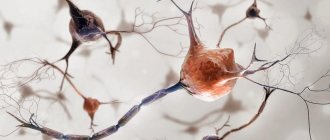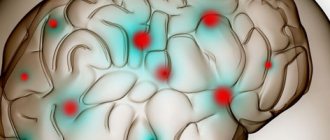What are cognitive functions?
Cognitive function is more than just memory. These include many other properties of the brain that we usually do not pay attention to. But once you lose even one of them, your quality of life drops sharply.
Cognitive functions are:
- memory;
- speech;
- ability to concentrate;
- the ability to recognize objects (by sight, hearing, touch);
- the ability to make purposeful movements.
Often one area of cognitive function suffers while others remain intact. This condition does not greatly interfere with a person’s adaptation and independent life - in this case we are talking about cognitive disorders. When a disorder occurs in several areas, and a person becomes socially maladapted and dependent on the environment, it is worth talking about dementia.
Cognitive functions, abilities and processes
Cognitive functions are processes in the brain that are involved when we learn about our environment.
The information that comes through our analyzers is processed. We interpret it and translate it into knowledge. They are stored in memory and accumulate over time, becoming life experience.
Cognitive abilities are:
- perception;
- attention;
- memory;
- thinking;
- imagination.
develops throughout his life , then he can be considered smart and intelligent.
Since he is able to perceive information from various sources in large volumes and for a long time; remembers it, reproduces it; draws conclusions; has logical thinking; can imagine the most vivid images based on what he saw or heard.
Why is dementia dangerous?
In addition to the extremely unpleasant fact of a decrease in a person’s intellectual abilities, this condition is dangerous due to changes in his behavior, which can become threatening both for the patient himself and for others. Moreover, as the disease progresses, patients become dependent on caregivers, and it is the quality of care that determines their life expectancy.
In fact, lack of nutrition, exercise and hygiene often causes death in people with dementia.
Signs of impending dementia
Like any other disease, cognitive disorders are much easier to prevent or slow down in the early stages. What to pay attention to and when to seek medical help:
- forgetfulness, difficulty maintaining attention;
- narrowing the circle of interests and circle of contacts;
- irritability, tearfulness or euphoria;
- sloppiness and untidiness in appearance, at home, at work;
- difficulty in orientation - both in time and place;
- reducing criticism of one’s own condition.
Cognitive impairment
Schizophrenia is characterized by disturbances in the cognitive sphere - another group of symptoms that can be distinguished in the clinical picture of the disease, in addition to negative and positive symptoms.
K. Kleist (1914) once wrote in detail about the formal disorder of thinking in schizophrenia, who drew attention to the fact that in this disease there is “sensory aphasia”, similar to aphasia in some brain tumors, in particular, those localized in the left frontal lobe ( Kleist K., 1960). In addition, K. Kleist drew attention to how a patient with schizophrenia constructs words and phrases, having difficulty trying to determine what a particular word means, for example, calling the fins of a fish “the wings necessary for swimming.” K. Kleist noted quite diverse manifestations of deficits related to the thinking and speech of patients with schizophrenia (“verbal deafness”, “amnesia of words” - it is difficult for a patient with schizophrenia to find words to define any phenomenon), partly comparing it with the aphasia of C. Wernicke.
| | What other symptoms can be used to recognize schizophrenia? |
In the 70s of the twentieth century, speech disorders in schizophrenia were quite actively studied by linguists. For example, E. Chaika (1974) studied neologisms in the speech of schizophrenia, which he called “incomprehensible speech” (eng. gibberish), while noting that linguistic disorders in schizophrenia can be considered a consequence of disorders in the functioning of those areas of the brain that are responsible for speech.
Currently, most experts agree that in schizophrenia the range of cognitive disorders is quite wide (Sverdlov L.S., et al., 1986; Vid V.D., 1993; Rozum S.I., 1998; Wykes T., Reeder C., 2005): decreased level and stability of attention (Sverdlov L.S., et al., 1986), decline in intellectual performance (Sverdlov L.S., Skorik A.I., Galanin I.V., 1984) , poor information processing (Nuechterlein K. et al., 1994), deterioration of working and especially verbal and spatial memory, decreased speed of visual-motor functions, difficulty solving problems, etc.
Note that in the last 20 years, the number of publications on cognitive impairment in schizophrenia has increased almost 7 times (Wykes T., Reeder C., 2005).
A wide range of cognitive impairments in schizophrenia and at the same time the absence of strictly specific cognitive disorders in this disease are usually associated with its unclear boundaries and clinical polymorphism of manifestations.
Patients with schizophrenia tend to perform poorly on a range of neuropsychological tests. The performance of routine tasks such as reading or mental arithmetic is often unchanged, but solving new problems and learning new material that requires a flexible approach is difficult.
Currently, cognitive impairment that occurs at an early age is considered a kind of “vulnerability marker” for the development of schizophrenia, since cognitive deficits impede the individual’s social integration. Let us recall that cognitive impairment is recorded in some relatives of patients with schizophrenia and is noted at the prodromal stage of its development.
The severity of cognitive impairment after the first episode of the disease may be a predictor of the course of schizophrenia. Thus, N. Verdoux et al. (2003) in their studies showed that deficits in visual and verbal memory should be considered a predictor of an unfavorable course of the disease in the next year after a psychotic episode.
Distinct cognitive impairments recorded at the initial stage of schizophrenia indicate an unfavorable prognosis for the course of the disease, the prospects for poor social and labor adaptation, and the patient’s early transition to disability. A decrease in cognitive functions has a more noticeable effect on the social (everyday) activity of a patient with schizophrenia than negative symptoms.
In schizophrenia, there is a violation of social cognition (“social cognitions”), for example, adequate perception of the mood of the interlocutor or his remarks. This is facilitated by: difficulty in concentrating for a long time during a conversation, inaccurate identification of the interlocutor’s facial expression, inability to semantically correct information, and initial insufficiency of visual perception. Impairments in long-term verbal memory affect the lack of understanding of the interlocutor’s brief remarks and remarks. If we also remember the relatively low IQ of patients with schizophrenia, we can understand the difficulties they experience in communicating with other people.
Cognitive abilities become the main indicator of the dynamics of the clinical picture of schizophrenia and the patient’s social activity.
Numerous studies have shown that neurocognitive deficits are a predictor of deficits in specific functional skills.
A number of psychiatrists, in our opinion, mistakenly believe that there are patients with schizophrenia with no cognitive deficit. Cognitive spectrum disorders can be attributed to a constant range of symptoms of schizophrenia; they can be recorded both during remission and during relapse of the disease. However, the correlations between the parameters of the disease course and the severity of cognitive impairment are nonlinear and multifaceted. In some cases, the same cognitive impairments are detected both after the manifestation of schizophrenia and at distant stages of its course.
Cognitive impairment in elderly patients with schizophrenia differs from cognitive impairment in individuals with Alzheimer's disease. In schizophrenia, rapid forgetting of the content of the material is not detected; rather, a deficit in encoding, recall, and difficulties with notation and solving specific problems are recorded. At the same time, the results of the meta-analysis prove the lack of specificity of neurocognitive disorders in schizophrenia. After all, it is often possible to identify the same individual signs of cognitive deficit in relatives of patients with schizophrenia. Symptoms of cognitive deficits are found among those at risk for schizophrenia spectrum disorders, as well as in never-treated patients with schizophrenia. In addition, an acute psychotic state in a number of mental disorders leaves behind cognitive impairments that are close to the manifestations of cognitive deficits in schizophrenia.
Cognitive impairment is known to occur at the height of a severe depressive episode. The results of recent studies of the cognitive sphere of patients with recurrent depression indicate that after severe episodes of depression, residual cognitive impairments persist, which, however, differ in structure from the cognitive deficits in schizophrenia.
Return to Contents
Which specialist should I contact?
There are many reasons that cause cognitive impairment. Among the main ones, it is worth highlighting, of course, vascular dementia and Alzheimer's disease. However, many other neurological conditions are accompanied by a decrease in cognitive functions: Parkinson's disease, Huntington's disease, prion diseases, rare forms of dementia - dementia with Lewy bodies, frontotemporal dementia. These conditions are borderline, they are mainly dealt with by a neurologist, but in case of depression, inappropriate behavior, or psychoproductive symptoms, the help of a psychiatrist may be required.
The opposite situation also happens.
Sometimes mental disorders can mimic cognitive impairment.
Thus, depression very often imitates cognitive disorders, because with depression, performance, the ability to assimilate new information are significantly reduced, the desire to communicate with people and take care of oneself disappears. In a situation of “pseudo-dementia,” treatment of depression leads to the restoration of cognitive abilities.
Diagnostic criteria
Diagnosis of malfunctions in brain functions is carried out if the patient or his immediate relatives consult a doctor with complaints of memory loss and deterioration of mental abilities.
A study of a person's current state is carried out using a brief mental status assessment scale. In this case, it is important during diagnosis to exclude the presence of emotional disorders (depression), which lead to temporary memory impairment. In addition to screening scales, the patient’s mental status is assessed through dynamic monitoring of him and his behavior. Repeated examination is scheduled approximately 3-6 months after the first one.
To assess the degree of dementia, the patient is asked to draw a clock
To quickly analyze the patient’s mental state, the so-called Montreal Cognitive Impairment Rating Scale is used today. It allows you to test many brain functions in about 10 minutes: memory, speech, thinking, counting ability and more.
The assessment is carried out by testing the patient. He is given tasks and a certain time to complete them. At the end of the tests, the doctor calculates the final results. A healthy person must score more than 26 points.
The MMSE scale is used in stroke to detect cognitive impairment
Reversible dementias
Some neurological and somatic diseases can lead to dementia. With timely diagnosis and treatment, the prognosis is positive.
Potentially reversible dementia may develop in the following cases:
- brain tumors;
- paraneoplastic process, with very different localization of the primary disease;
- severe form of diabetes mellitus;
- severe hypothyroidism;
- severe forms of somatic diseases;
- normal pressure hydrocephalus;
- chronic alcoholism;
- addiction;
- severe deficiency of vitamin B12 (cyanocabalamin) and folic acid (vitamin B9), vitamin B1 (thiamine);
- long-term use of large doses of drugs that contribute to cognitive decline;
- HIV and syphilis.
Main causes of organic personality disorder
- Severe traumatic brain injury
. Any kind of mechanical impact affects the state of the brain and can cause the development of various symptoms of organic origin. For a permanent personality disorder to form, the severity of such trauma must be significant. In mild cases, neighboring cells can compensate for the damage, and the person will not show changes in behavior, thinking, or other areas of functioning. - Infection
. This should include viral diseases (including AIDS), bacterial diseases. Organic personality disorder is often caused by fungal neuroinfections. Their specificity is the targeted damage to brain cells, as a result of which their function is lost. Depending on the location of the pathological process, these may be encephalitis, encephalomeningitis and other diseases. - Tumors
. Unfortunately, the localization of the pathological process in the brain obliges even a benign differentiated tumor to be considered malignant. The proximity to the main centers of human life makes such a disease extremely dangerous. Therefore, oncology should be considered one of the reasons for the development of organic personality disorder. Even the smallest tumor disrupts the functioning of a local group of neurons and causes disruptions that can affect a person’s psyche and behavior. This often happens even after stable remission or radical surgery. - Vascular diseases
. The most common diseases at the moment - atherosclerosis, hypertension, diabetes mellitus - often target cerebral vessels as their primary target. Since they provide oxygen and nutrients to sensitive neuron cells, disruption of cerebral blood flow will provoke an attack of ischemia. In the long-term development of these diseases, chronic lack of oxygen in brain cells leads to disruption of their functioning and signal transmission. Consequently, this can manifest itself as mental symptoms in the form of an organic personality disorder. - Alcoholism and drug addiction
. Systematic use of any psychostimulants affects the functioning of the brain. Hallucinogens artificially cause irritation of those areas of the cortex that are responsible for perception. Accordingly, over time, the cells cease to cope with the function assigned to them and an area of organic damage appears. This should include any psychoactive substances that can somehow influence the state of the brain and, when taken for a long time, cause irreversible morphological changes. - Autoimmune diseases
. Some nosologies from this group are characterized by a specific effect on nervous tissue. For example, in multiple sclerosis, the myelin sheath of neuroglial fibers is replaced by connective tissue. Point foci of this process explain the name of this disease. The more nervous tissue is replaced by connective tissue, the greater the likelihood of developing an organic personality disorder. - Convulsive seizures
. The main cause of the most common disease in this group, epilepsy, is the presence of a permanent focus in which a nerve impulse constantly excites a certain area of the brain. This inevitably leads to disruption of the functioning of such zones and can be manifested by changes in behavior and thinking. The longer a person has this disease, the greater the likelihood of developing an organic personality disorder.
Diagnosis of dementia
Based on the severity of symptoms, cognitive impairment is divided into:
- moderate cognitive impairment (self-care is preserved, neuropsychological testing reveals significant impairments);
- dementia - mild, moderate or severe (self-care is impaired, neuropsychological testing reveals significant impairments).
Some researchers identify a stage of mild (mild or subjective) cognitive impairment (MCI), when the patient actively complains of forgetfulness, inattention, and inability to cope with something, but neuropsychological testing determines normative indicators of higher brain functions (HMF) or individual minor difficulties in 1-2 cognitive areas, without disturbing the general cognitive status. Such conditions may be a manifestation of depression, increased anxiety, the result of situational fatigue, or the first preclinical signs of a neurodegenerative brain disease (for example, Alzheimer's disease).
If there are complaints of memory loss, clinical examination of patients is aimed at:
- establishing the fact and assessing the severity and nature of cognitive impairment: neuropsychological testing - targeted assessment of blocks of higher brain functions, determination of the so-called pattern of cognitive impairment, which has its own characteristics in various diseases;
- identification of other symptoms of damage to the nervous system: - thorough neurological examination; — a detailed analysis of the patient’s life history, including hereditary history, data on education, professional activities, bad habits, previous injuries and diseases; — instrumental and laboratory examination to assess the condition of the brain and risk factors for damage to the nervous system and exclude causes of potentially reversible dementia.
Before visiting a neurologist, if the patient has memory complaints, a number of examinations can be performed:
- UAC;
- KAM;
- detailed biochemical blood test (total protein, creatinine, glucose, glycated (glycosylated) hemoglobin, total and direct bilirubin, liver enzymes (AST, ALT, CK, ALP, GGT), total cholesterol, lipid spectrum, potassium, sodium, calcium, vitamin D, vitamin B12, folic acid, TSH);
- MRI of the brain without contrast on a device with a power of at least 1.5 Tesla, with the obligatory performance of coronal sections to assess the volume of the hippocampi (the results are best presented on disk in DICOM format);
- ECG;
- UZDS BCA.
It is also useful to analyze the following patient data:
- bad habits;
- list of medications taken regularly;
- list of usual food products;
- drinking diary;
- physical activity diary, daily routine.
Even with severe chronic disease, the earliest possible diagnosis of the disease and an integrated approach to treatment significantly improves the prognosis of patients and increases their life expectancy.
Definition of disease
“I think, therefore I exist,” wrote the philosopher Rene Descartes. He put forward this statement as a primary truth that cannot be doubted. Indeed, the ability to think is the main indicator that allows a person to identify himself in this world, and it is the violation or loss of this ability that radically changes our sense of self.
Cognitive disorders are a violation of one or more cognitive (cognitive) functions of the brain compared to an initially higher level (individual norm).
Cognitive are the most complex functions of the brain, through which rational cognition of the world and purposeful interaction with it occurs. These include:
- memory - the ability to imprint, store and repeatedly reproduce received information
- intelligence - the ability to analyze information, solve problems, build logical conclusions
- speech - the ability to express one's thoughts verbally and understand spoken speech
- gnosis - perception of information, the ability to combine elementary sensory sensations into holistic images
- praxis - the ability to learn and retain a variety of motor skills
Cognitive impairment may be mild, moderate or severe.
With mild cognitive disorders, only the person himself notices dysfunction: he notices that it has become more difficult for him to memorize and recall information, clearly formulate his thoughts and convey them to others. However, the violations do not go beyond the average age norm and are not noticeable to outsiders.
Moderate cognitive impairment is already attracting the attention of others: but it does not yet lead to significant difficulties in everyday life and does not interfere with work, although complex types of intellectual activity become difficult to perform.
Severe levels of the disorder are called dementia or dementia. From the name it becomes clear that impaired cognitive functions in this case cause significant difficulties in everyday life, make professional activities impossible, limit social contacts and often lead to loss of independence and autonomy. A person with dementia is poorly oriented in time, space and his own personality, and may “lapse” into childhood or adolescence (often happens with Alzheimer’s disease).
Dementia mainly affects older people, but is not a normal part of aging. According to the World Health Organization, there are 47.5 million people living with dementia worldwide, and up to 7.7 million new cases are reported every year.
How is dementia treated at the Rassvet Clinic?
The Rassvet Clinic welcomes a multidisciplinary approach to this problem. A thorough examination by a doctor, a lengthy conversation, testing on a number of scales and the joint work of a neurologist and psychiatrist help to make the correct diagnosis, and additional examinations can identify the specific cause of cognitive decline. This is what helps to develop further effective treatment and rehabilitation tactics.
Drug therapy for dementia can reduce the rate of progression of the disease and prolong the patient's life. Active learning of new skills, constant memory training (cognitive stimulation) and emotional support of loved ones are also of fundamental importance in the treatment of dementia - especially at the stage of moderate cognitive impairment.
Symptoms of cognitive disorders
Cognitive dysfunction is characterized by specific symptoms, which depend on the severity of the pathological process and which parts of the brain it affects. Damage to individual areas causes impairment of individual cognitive functions, but disorders of several or all functions at once are still more common.
A disorder of cognitive functions causes a decrease in mental performance, memory impairment, difficulty expressing one’s own thoughts or understanding someone else’s speech, and deterioration in concentration. With severe disorders, patients may not complain about anything due to a loss of criticality towards their own condition.
Among cognitive pathologies, the most common symptom is memory impairment. Initially, progressive disturbances arise in remembering recent events, and gradually, distant events. Along with this, mental activity may decrease, thinking may be impaired, as a result of which the individual cannot correctly evaluate information, and the ability to generalize data and draw conclusions deteriorates. Another equally common manifestation of cognitive impairment is deterioration in concentration. Individuals with such manifestations find it difficult to maintain vigorous mental activity and concentrate on specific tasks.
The term moderate cognitive personality disorder usually means a disruption of one or more cognitive processes that goes beyond the boundaries of the age norm, but does not reach the severity of dementia. Moderate cognitive impairment is mainly considered a pathological condition, the result of which transformations at this stage are not limited to age-related involutive processes.
According to a number of studies, mild cognitive impairment syndrome is observed in 20% of individuals over 65 years of age. Research also shows that dementia develops in 60% of individuals with this pathology within five years.
Moderate cognitive impairment in 20-30% of cases is stable or slowly progressive, in other words, it does not transform into dementia. Such disorders can go unnoticed by individuals for quite a long time. However, if several symptoms are detected in a short period of time, then it is worth contacting specialists for advice.
The presence of a cognitive disorder is indicated by the following symptoms: difficulties in performing ordinary counting operations, difficulties in repeating information just received, disorientation in an unfamiliar area, difficulties in remembering the names of people new to the environment, obvious difficulties in finding words during normal conversation.
Moderate cognitive disorders, identified in the early phases of their development, can be quite successfully corrected with the help of medications and various psychological techniques.
In order to assess the severity of cognitive impairment, special neuropsychological testing is used, which consists of answering a number of questions and performing certain tasks by the patient. In accordance with the test results, it becomes possible to determine the presence of deviations in certain cognitive functions, as well as their severity. Test tasks can be in the form of simple mathematical operations, such as adding or subtracting, writing something on paper, repeating a few words, identifying objects shown, etc.









